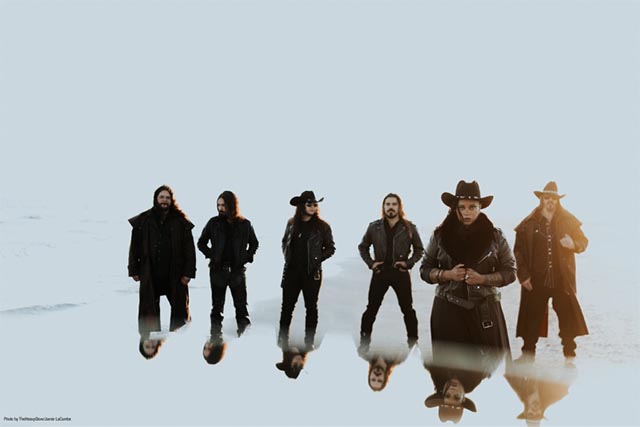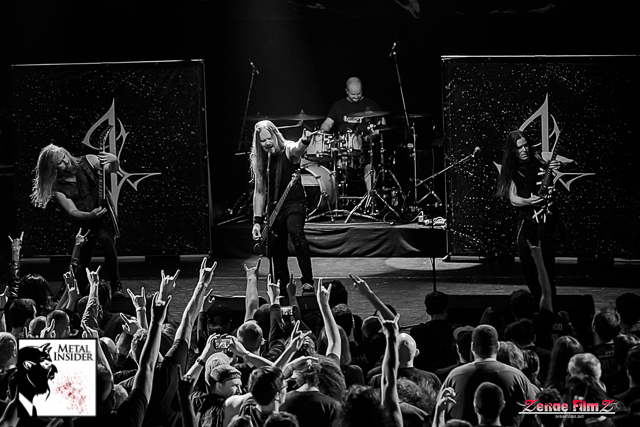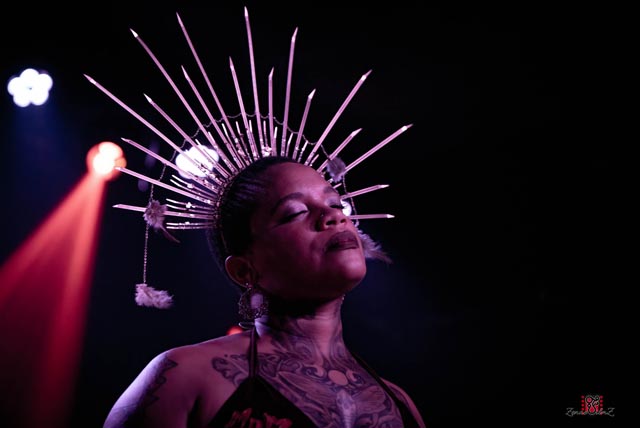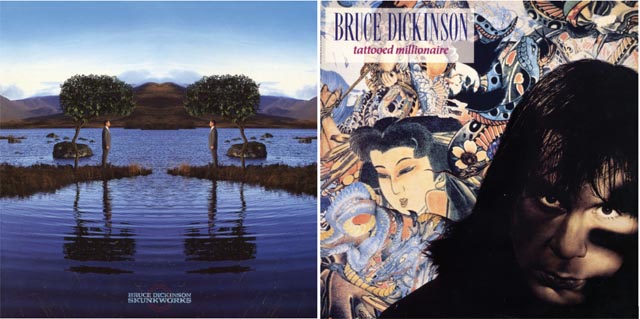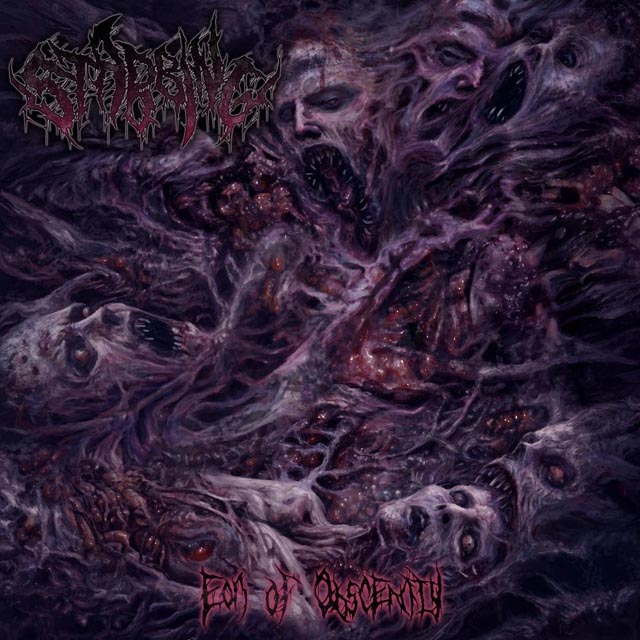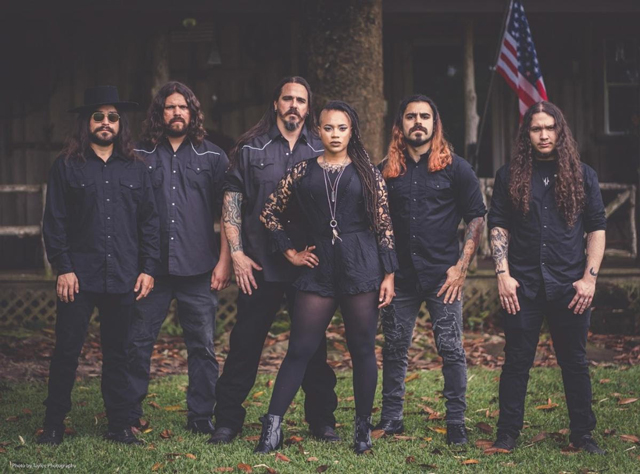
Oceans of Slumber’s upcoming self-titled record will be released on September 4th via Century Media Records (pre-order here). We caught up with vocalist Cammie Gilbert to talk the record, being part of the next Ayreon album, and discussing more profound subjects such as having very few black female vocalists in metal, and more.
The self-titled album in a way has softer, romantic, and somber moments than the prior, The Banished Heart. What was the overall intention?
There’s a lot of new elements to the new album. I wanted to dive into some deep sort of conflicts that I saw more externally versus internally. And The Banished Heart was a real deep dive into an internal conflict that Dobber and I were specifically experiencing during that time. A lot of changes in our lives that impacted us in these well, not sort of, but in these very negative ways. And so with the new album I wanted to, I obviously feel internally in a better place and I’m more interested or I feel more inspired when I find conflict versus just the pursuit of happiness. And so what I wanted to do for the new album is focus externally on things that I felt like not just a singular problem to myself, but something that I could gather together and experience with other people to give validation to these feelings, or give a place to some of these ideas that maybe people don’t get as much recognition for in their life.
Are there any specific themes that you want to share?
Well, I mean, it’s kind of come to light now and I wrote these songs months and months ago and they went through the process of being mastered before they’re ready for release and all that. But when I wrote them, obviously the conflicts that we see now have been around, and Dobber and I talked about the different motifs and things that we wanted to use. And he’s like, “You’re a black woman in the south and how does that feel?” And so we put that into the songs and I expanded on these issues and on all of these climates that I saw, obviously not knowing where things were going, that they would be so timely and speak so directly to the tones and moods that are present right now.
Can you talk more about the songs, “I Mourn These Yellow Leaves,” “September (Those Who Come Before),” and “Imperfect Divinity?”
“I Mourn These Yellow Leaves,” Dobber and I collaborated a lot on the lyrics for this album, and that’s one that is very heavy with imagery that he gave to me. “I Mourn These Yellow Leaves” is about the friendships and the relationships that come throughout life and how they’ll die away or they’ll fade, much like the leaves fade for fall. And you gather them up and you have to discard them, and you have to accept that you are changed. And whether that be for better or for worse, that the depth of these relationships and the depth that other people go to may not always take you with them, or you may not always be on that journey with them. And sometimes in life, you collect too many people or you extend yourself for too many people, and you have to sort of shed them or leave them behind. And it’s about this, sort of those dark veins are those exchanges that you have to reluctantly sort of let go and move on from.
The atmosphere for those (“Imperfect Divinity” and “September”), everything’s meant to be very cinematic. We want it to invoke such a grand mood and for it to create its own atmosphere that you feel completely surrounded and encompassed by it. But this one is that same dark exchange. It’s like, we want to have these glimmers in these, this availability of these embers of hope, but obviously keep the underlying thread to hang low.
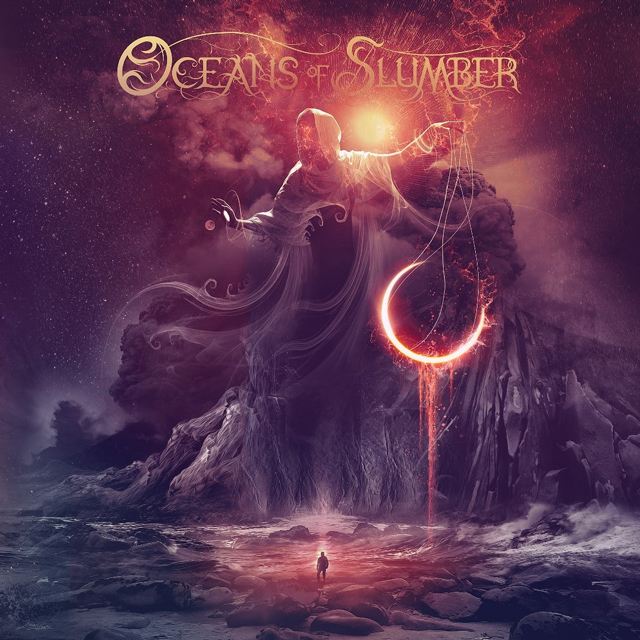
In addition to Oceans of Slumber, I noticed that you’re going to be featured in the next Ayreon album, Transitus. How did that come together, what was that experience like for you?
It’s super exciting, I am reminded with every teaser that comes out. That project, it had to kind of, it sucks keeping something a secret. Obviously I’ve been used to saying and, as soon as you’re working on something, you get to announce it or you get to share little snippets. And so to sit on something so big, that was just a secret, but it basically came about, we met a friend of Arjen [Lucassen] over in the UK and he was interviewing us and asked if there was anything that we wanted to tell Arjen. And so Dobber is like, “Yeah, if he could get any of us on an album, we’re big fans, and if you could have him listen to The Banished Heart, that’d be great.” And so he followed through with that request. Shortly after that Arjen wrote that he loved The Banished Heart and he would love to work with me someday. And we were like, “Yeah, of course that’d be great.” And then maybe a couple more months after that, it was, “You want to be on the album?” And I peed my pants.
So we flew out there and he’s [Arjen] the tallest person I’ve ever stood next to. He’s so vibrant. And he’s so much a character, absolutely easy and amazing to work with. He knows what, when he’s listened to your voice, it’s like he’s taken it in and filtered it back out. So he knows exactly what you are capable of and exactly what he wants you to do, and wants from you. And so I appreciate someone having that direction versus being like, “We’ll just do what you feel like, whatever.”
And so to go in and have him lead, because I haven’t really worked with too many other producers or engineers outside of our team here in Houston for when we do our albums. And so I was really nervous, working with them on the new album I’m like, “Am I difficult? I don’t even know. They’re not going to tell me here.” Until we got there, he’s like, “No, no, no, you’re very easy to work with, and this is exactly what I want.” And I’m like, “Well, I’ll do that.” And that makes it much easier.
And so he had big plans for this album and there were things he wanted to do. And so we sat on it for a long time and couldn’t say anything. When it was finally announced, I felt like such a weight was lifted. Because they were like, “Ah,” and then the other weight was like, “Oh, now I’m on there. And all these people are like, ‘Hey it’s Cammie or, who is she?'” It’s still a big, not guessing game now, but it’s still a lot of anticipation, because I know a little bit more about what’s coming out, but other people don’t.
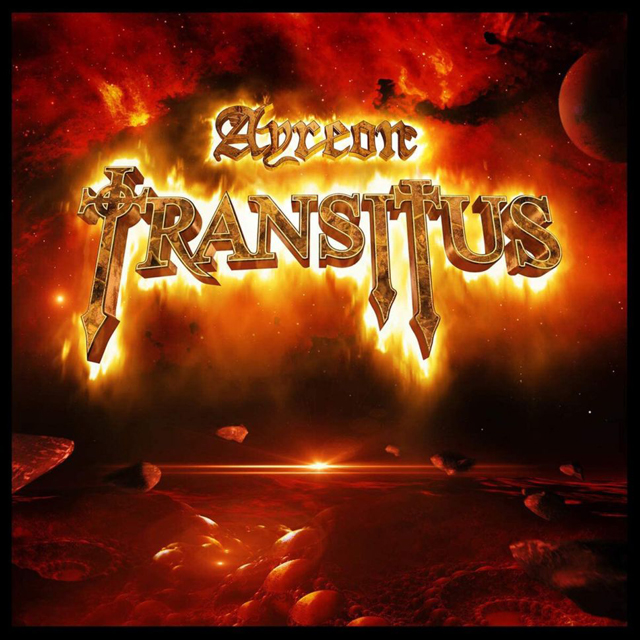
I’m definitely excited for it. I know he picks the greatest voices, and you have a beautiful voice.
Thank you.
Of course. I can’t wait to hear it. I’m excited too, for you and the album. I wanted to go back to a more serious subject. I read your piece in Heavy Culture, and when you first experienced racism and the car ride back to Houston. It was disturbing and very sad to read about that experience. And, because in metal, the way I’ve seen metal or at least in my bubble, I’ve always seen it as unity, everybody of all backgrounds joining together from all over the world as one big family. And knowing this isn’t the case for everyone, including, outside of the metal scene, is heartbreaking that racism continues to happen in 2020. I wanted to ask, have there been any other uncomfortable moments for you such as while on tour?
I’ve been fortunate to not experience too many issues. I know sometimes it’s like nothing bad happened, but when we tour through the U.S. sometimes we get asked where do we want to stop for the night, or where do we want to stop to eat? And we always make a point that, well, we don’t stop through Mississippi or Alabama. If we can pick one or go to a different place, then that’s ideal, if we’re going through the South. And so it’s little variables, little nuances like that. Well, we’ve been fortunate not to have anything pop off, but I’m also traveling with all white men. If they’re going to single somebody out or they’re going to try and pop off, it’s like, I have Dobber, who’s my spouse with me. And then whatever other band has been from overseas. And you know, I’m not particularly attracting a lot of attention like that, outside of obviously it’s a big tour van or something, but they’re not pinpointing me to be aggressive towards or have any kind of racial conflict towards.
When we had the first band, because obviously now our band’s more diverse, initially with the first band we were in, we were up north somewhere. I think we were in one of the Carolinas. Our van broke down and had to get service for, something’s wrong with it, and it was getting serviced. And we were in like a, it wasn’t Walmart, but it was like a Walmart. And this little boy, I mean, people were looking at us like we were aliens and it’s predominantly white area. It definitely had an air that it was because they were walking around with me, and we’re all tattooed and wearing black so it’s sometimes hard to differentiate what exactly is attracting scowls. And we had this little boy follow us around with his cellphone, just taking pictures of us. Like we are just like Martians. So it was the weirdest thing, and then people were… This woman full on just gasped and clutched her purse, and moved away from us. It was the strangest interaction ever.
That was a pretty conservative, relatively homogeneous town of just white people. And so I think we weren’t really their flavor. They’re like, “Y’all fix your van and get out of here.”
But overall on tour here and abroad, I can’t really pinpoint any true racial interactions, fortunately. I can appreciate it, and it’s anecdotal either way, but I can appreciate that with the band, I’ve been fortunate not to have any issues. I’ve gone places and someone thought I was the merch girl, but it’s not because I’m black or something, but that’s just because I’m a woman in metal, but that’s something completely different. But yeah, I’ve been fortunate to have a pretty smooth go when it comes to touring. I mean, when we were in Hungary. I know one night, crap, I want to say, we were somewhere, and they were worried about Nazis coming, or not Nazis, skinheads. And they were like, “There are a lot of skinheads that frequent here.” I think we were with Enslaved and they were like, “Last time we were through here they came to the show, causing trouble.” And so, a few did come to the show and then after the show, they came up to me and they were like, “You have a beautiful voice and we loved your show.” And I was super confused. I was like, “I don’t know this culture. I don’t understand. Your skinheads are nothing like our skinheads.” So I didn’t really know what to do with that, but they didn’t pop off and everything was fine. So I know that I’ve been fortunate in that aspect to not have experienced anything too traumatic.
That’s awesome. And it’s lucky for you, I mean, sadly it’s not for everybody. There’s not a lot of female black singers in metal and we need more. And your voice is amazing, as I said. What makes you think that we don’t have more female black singers in metal?
I think it’s a multitude of reasons. Recently I did a poll among friends and just in general, because I wanted to know, sometimes I get the sentiment told to me via online comments and stuff that I sound pop, or I sound hip hop, and I don’t fit the music. And so I asked, because I want to know if this is a black, a racial thing or if it’s a sexist thing. And so basically, the feedback was it’s a sexist thing. It’s not just because… They’re not saying that to me specifically like as a black female, it seems to be the tone that female, clean singing that isn’t symphonic is connotated to sounding pop. It just, by default, to the average metal listener is just defined as too poppy, right?
And so I feel if you add in the elements of what comes with clean singing or what, let’s say, might influence the majority of black female singers, there’s a good chance that it’s more soul, it’s more gospel. It’s more RNB, it’s more blues. And so they’re going to be run to go down a different path and not pursue metal. So in Houston, I sang and I was known around generally, not too large like now, as a vocalist. And the people that hung out in our music scene and, not the metal scene, but in the broader music scene, were very pushy for me to sing in hip hop or sing for… It was like, I was basically told don’t go anywhere near rock and metal. And it’s like, “Why?”
And not that there’s no good reason, but it’s like, “Your voice just fits this and your voice just fits that.” And to me, that’s not fair, and it doesn’t make a lot of sense. And you’re never going to have good inclusion or you’re never going to have a diversity or dynamic to sound if it’s only like, well that fits that. And what Dobber heard in my voice and what he heard from me… I’m a very melancholy person. I’m in and out of bouts of depression and what I identify with metal and metal-adjacent music is, what I identify with the music that I find, if it makes me, if I’m already sad and it makes me sadder then I’m like, “This is going on a playlist.” And I like things that give me these, not give me these dark feelings, but validate my dark feelings, because I feel like that helps me release them.
And so what Dobber heard in my voice that he feels like this, gospel and soul are usually dark fucking sounds. They’re dark songs, they’re dark lyrics. Blues is sad. And so he’s like, why wouldn’t this go with… If you put a soulful, dark gospel singer over something like 40 Watt Sun and you don’t think that would devastate people? And so that’s what he wanted to do. He’s like, “I want to take you, you’re this dark songbird and put it with this music that backs it up to bring home the whole package, to bring in that whole essence with a female touch.” So, there’s obviously a lot of variables of why more black people in general are not into metal.
I think that’s changing. Even from the time that I got in the band to now, I feel like there’s just a host more alternative black and black metalhead females that I just went on a search for in the beginning and almost couldn’t find. Who are now, I feel like I can find a lot more and they’re getting a lot more prevalence, but I hope that that trend just continues. And I don’t know fully how to help it along other than doing what I do and being true to why I do it and who I am, and doing it. I consider myself a metal-adjacent person.
I didn’t grow up just demographically, because of what I had around me, with access to as much metal. And my parents were super religious so death metal and grindcore were not going to be allowed in my house. But now that I can have access, or now you have younger black kids and people who can have access to that or to do, because of, if I had a cell phone, it would have been over. I would have been sneaking off or something. But I had to get an actual CD and then my mom could find it or see it’s all, in the trash, you’re like, “No…” So hopefully that changes and it continues to change.
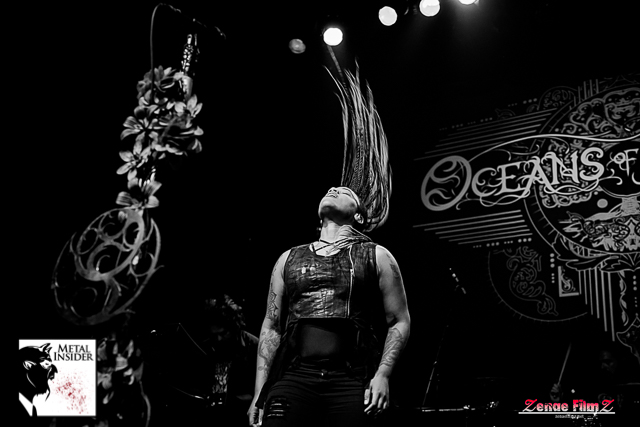
I hope so too. I love diversity and I think one of the things that got me drawn to Oceans of Slumber is the diversity in the music, with your clean singing and the harsh vocals in the background. There’s just so many layers to your sound that I’m personally mesmerized to it. And I hope that it can inspire and influence others for years to come.
Absolutely.
I was curious about the release coming up and the question of when concerts are ever going to come back to normal, do you guys have any plans for a virtual live stream record release show?
Yes. We’re definitely going to try and do something like that. We have a couple options in Houston with some venues to either try and do a socially distanced, very spread out. We obviously want to keep everybody safe and ourselves safe. So either way, it would be live or broadcast. We want that real time connection. And that’s why we kind of shy away from trying to do something pre-recorded. But we do certainly, it’s in the works. Because I want to elaborate, I miss the stage. If I have to put a bunch of stuffed animals out there, I’ll do it. I need something.
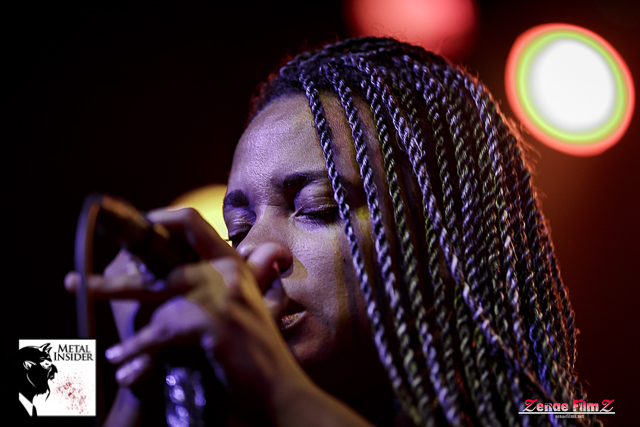
Oh my gosh, please do.
Go get a bunch of rescue dogs and have, just hang out. So we’re going to figure something out though.
No, seriously. If you guys had rescue dogs and stuffed animals in the venue, and if they allow it, that would be amazing. Please do that.
For sure.
Is there anything else that you want to say to your fans?
That obviously I miss being out there, I miss connecting with everyone. These are incredibly trying and incredibly crazy times, but this is our one lifetime and the decisions and the things that we challenge ourselves to think and do now are what’s going to shape what it’s like when we all get back together. And we are in this together. Your neighbor is not your enemy. And we have to look for the lines of solidarity between us, more so now than ever before. Just find a way to have common ground and find a way to come together. What you believe in and what you do, care about your neighbor, care about the other. Because it’s going to come back on you, it’s going to come back onto yourself. So we are all in this together. We have one planet and one life, so we need to do the best that we can with it.
Oceans of Slumber released their second single, “The Adorned Fathomless Creation” on Friday (10th).
The group commented about the track:
“Violence, revenge, retribution, repeat. The adorned fathomless creation that is humanity, that is society, that is each of us. Warped and blinded by this eye for an eye mentality, we stumble along the path of this insidious and cyclical nature of violence and pain. Hate begets more hate. Fear a contagion. Compassion a lost art of emotional bending. Outcry, anger, rage, repeat. We long for the gentle embrace of compassion, hope to be soothed by a love that is nowhere to be found. So the machine churns, spewing smoke along a degenerative wasteland. Victim, valor, vengeance, repeat. Our only hope is to remember that among ourselves is an ability to connect, an ability to heal, an ability to grow. To break the machine and free ourselves from its corrosive and cancerous nature. Teach, acknowledge, heal, repeat.”
Watch the clip below:

